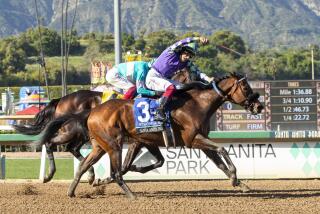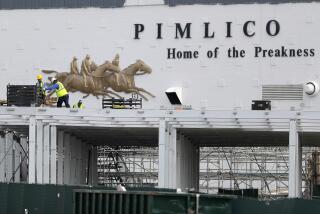BOOK REVIEW / NONFICTION : A Race to the Finish at Calumet Farms : WILD RIDE: The Rise and Tragic Fall of Calumet Farm Inc., America’s Premier Racing Dynasty <i> by Ann Hagedorn Auerbach</i> ; Henry Holt, $22.50, 384 pages
- Share via
When Lucille Parker Wright Markey died in 1982, she was eulogized as “the Grande Dame of Racing,” the woman who for decades had presided over the country’s premiere racehorse stable, Calumet Farm. She was the last of her kind, people said: old-fashioned, determined to raise her own thoroughbreds, committed to racing less for the social whirl and financial gain than the love of horses--particularly Calumet’s prized stallion Alydar--and the desire to excel.
Markey left most of her $300-million estate to charity, but the sturdy, debt-free Kentucky farm remained in the hands of the founding Wright family, to be run by J.T. Lundy, the son of a sharecropper who had married one of Markey’s granddaughters. Ten years later, Calumet Farm was bankrupt, listing debts of more than $167 million. Something like $100 million was missing--and so was Lundy, who had almost single-handedly destroyed not only the farm but the Wright family fortune.
Today most Wright family members live in Florida, debt-ridden tax refugees attempting to protect their remaining assets from the creditors pursuing them, thanks to their former in-law. Lundy is also reported to live in Florida these days, and like some of the Wrights, he too has declared personal bankruptcy.
It might seem, at first glance, that by pillaging the Wright estate Lundy has succeeded in bringing the family down to his level, but that’s probably not the case: Rumors persist that Lundy--unlike the trusting, naive Wrights--is still rich, having socked away some ill-gotten Calumet millions well beyond the reach of U.S. law.
The fall of Calumet Farms is a dramatic story, and in “Wild Ride” former Wall Street Journal reporter Ann Hagedorn Auerbach tells it exceptionally well.
Race fans will love the book, of course, but so will anyone interested in recent cultural history, for “Wild Ride” is as much about 1980s greed as it is about horses. In a different decade, Lundy might have enjoyed a rags-to-riches life, complete with happy ending; a smart man with good horse sense.
Lundy was not necessarily the wrong man to run Calumet. Once in charge, however, it’s clear that he lost all perspective, becoming less interested in breeding horses and winning races than in the addictions of the era--power, money and deal-making.
To his credit, Lundy modernized Calumet, but he was soon spending money as if there were no tomorrow, buying private jets, staying in the best hotels, eating in the most expensive restaurants, and always paying the tab for his friends and associates--with the farm’s money, of course. Auerbach doesn’t spend much time unearthing Lundy’s motivations, but it’s a sure bet that revenge was on his mind: You get the feeling that Lundy end-ran the legal trust that supposedly ran Calumet in part to embarrass the Wrights and began associating with convicted felons in part to shock local bluebloods. And at some level, who could blame him? When Lundy began running Calumet, the Kentucky gentry could be heard saying, cruelly: “He’s drinking champagne, but he can’t spell it.”
It’s also true that money, for many people, was easy to come by in the 1980s. The horse business, being a glamour play, boomed during the decade, drawing all kinds of money from Wall Street, Texas, Japan, South America and the Middle East.
With Lundy, however, money in was inevitably money out: Suffering from advanced deal-itis and staggering lines of credit, he arranged breeding, purchasing and sales agreements that leveraged Calumet up to its devil’s-red eaves.
On the plus side of the equation, he sold breeding rights to Alydar, the farm’s principal asset, for millions of dollars, and often produced winners; on the minus side, he gave away or pre-sold those same extremely valuable rights to friends and associates, hyped auction prices to keep the thoroughbred market artificially high, and occasionally paid outrageous sums for horses--such as $25 million for half-ownership of Secreto, the winner of 1984’s Epsom Derby. No wonder the cost of operating Calumet soared from perhaps $2 million annually to $12 million during the Lundy era.
It was only a matter of time before the house of cards collapsed. The triggering event was Alydar’s death in 1990, which Auerbach suggests--mildly--may have been deliberately orchestrated to allow Calumet to collect on the horse’s $36.5-million insurance. There’s little evidence for that theory, however, and in any case farm management went to heroic efforts to keep Alydar alive--although it is true, as only Lundy and a few other people knew at the time, that with most of his breeding seasons pre-sold, Alydar was probably worth more dead than alive.
But Alydar’s death aside, “Wild Ride” is told with care and circumspection, Auerbach setting out the evidence in a way that permits readers to decide for themselves whether Lundy is indeed a scoundrel (yes) and whether most of the Wrights were extraordinarily credulous (ditto).
One irony that Auerbach doesn’t stress is the ways in which Lundy’s tale mirrors that of the Wright dynasty’s founder. William Wright became rich in the Roaring Twenties, just as Lundy became rich during the 1980s Bluegrass Bubble. William Wright didn’t exactly earn his money in an upright manner, the Federal Trade Commission determining in 1927 that his claims for his baking powder were deceptive.
Unlike Lundy, however, the elder Wright knew when to quit. He sold the Calumet Co. for $32 million to the future General Foods months before the Great Crash of 1929 and used the money to begin turning Calumet Farm into the respectable operation that his great-grandson-in-law would eventually shatter.
More to Read
Sign up for our Book Club newsletter
Get the latest news, events and more from the Los Angeles Times Book Club, and help us get L.A. reading and talking.
You may occasionally receive promotional content from the Los Angeles Times.










